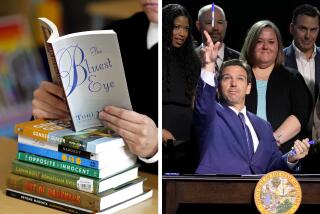Read This Book, President Urged : * Education: Publishers Weekly takes an unprecedented stand in its strong endorsement of ‘Savage Inequalities,’ about school segregation.
- Share via
NEW YORK — Using the cover of its magazine as its forum, Publishers Weekly has taken the unprecedented step of sending an open letter to President Bush that recommends that he read a new book by Jonathan Kozol.
Fred Ciporen, group publisher at PW’s parent organization, Cahners Magazines, said the letter to Bush in the Sept. 27 issue marks the first time in Publishers Weekly’s 119-year history that the publishing trade magazine’s cover and succeeding pages have not been sold to advertisers. Publishers normally pay between $18,000 and $30,000 to promote their books on a PW cover.
“We urge you to read a startling and disturbing new book, ‘Savage Inequalities’ . . . which we think will be crucial to any serious debate on the current state of American education,” the letter reads. An editorial appears on the magazine’s first few pages.
Ciporen said the letter and editorial about “Savage Inequalities” also represented Publishers Weekly’s first actual endorsement of any book. He said the magazine’s entire editorial staff supported the decision to devote the cover to the 180-word letter because “we were all very, very moved” by Kozol’s book.
“Savage Inequalities” contends that America’s public schools are racially segregated and that inequities between predominantly white suburban schools and largely black and Latino urban schools are growing. It will be published in October by Crown Publishers.
“We felt very strongly that the whole educational system is disintegrating into a segregated mess,” Ciporen said.
The letter to Bush declares, “The future of our business--publishing--obviously depends on the quality of our schools and the readers they produce.”
Publishers Weekly publisher George Slowik said the decline in public education and the rise in illiteracy have been subjects of concern and study within the book industry. When copies of the new Kozol book became available, “everything started dovetailing around the industry wanting to endorse an issue,” Slowik said.
“We wanted to be more aggressive about using our magazine to encourage private sector involvement and to rally our industry around issues that are so critical to it,” Slowik said.
With a global circulation of 38,000, Publishers Weekly is better known for its features on U.S. and international publishing and its thousands of reviews of books each year than for taking political positions. The publication ran statements in opposition to censorship and other infringements of free speech during the McCarthy era, “but it never did anything like this,” Ciporen said.
Slowik said, however, that he expects that Publishers Weekly will not shy from future displays of concern about issues it considers important.
“While (it is) unprecedented, we don’t intend for this to be an isolated event,” Slowik said.
Copies of the Sept. 27 magazine will be sent to members of Congress, to the country’s 50 governors, to mayors of large cities and to educational leaders in this country, Slowik said. Slowik said he does not expect a White House response.
More to Read
Sign up for our Book Club newsletter
Get the latest news, events and more from the Los Angeles Times Book Club, and help us get L.A. reading and talking.
You may occasionally receive promotional content from the Los Angeles Times.







